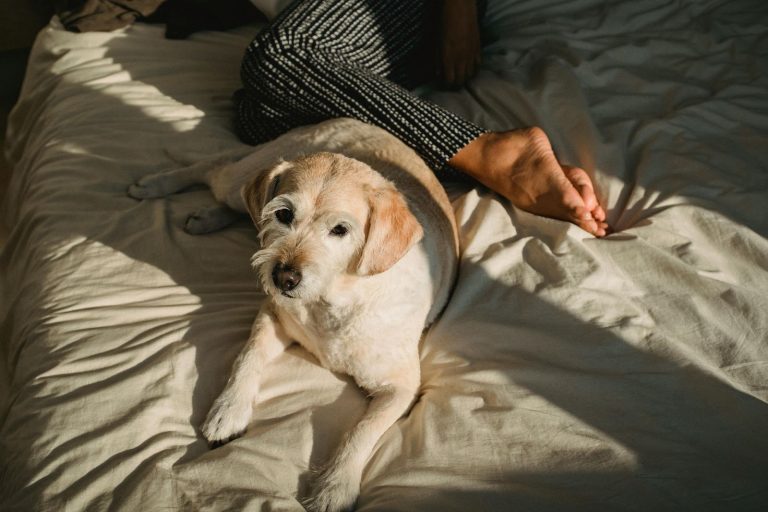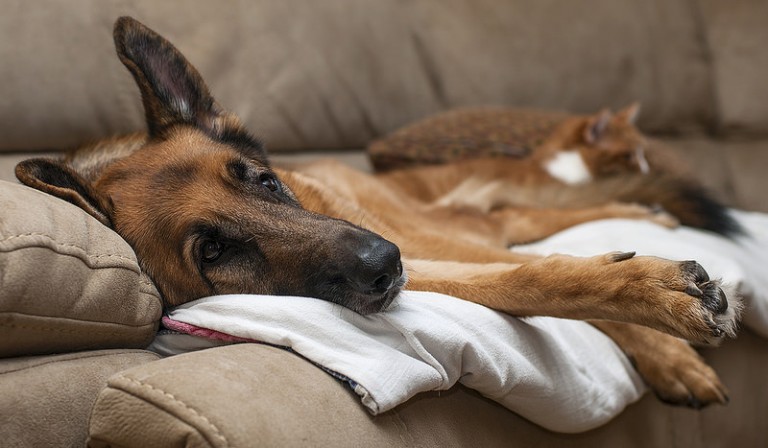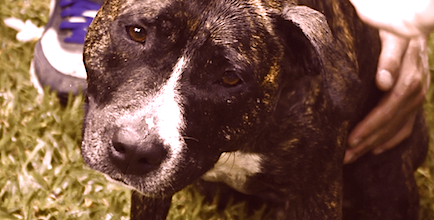It’s Time to Talk About This “Rainbow Bridge” Thing
Does the idea of a Rainbow Bridge for deceased pets comfort you? Two writers offer arguments for and against it. And we want to hear your thoughts, too.


Don’t leave your pet’s safety to chance
Sign up for Petful recall alerts today.

Part 1: Enough With the Rainbow Bridge: Why It Didn’t Ease My Grief
It has been 8 months since our dog Ajax died in my arms.
My husband and I still talk about Ajax often, and I find myself frequently staring sadly at the large photo of him above our fireplace.
After Ajax’s death, we received an outpouring of support and kind words from friends, family and the veterinary staff. Mostly there were comforting words of what a great life Ajax had and that we’d done all we could.
The people who responded to Ajax’s death with a reference to the Rainbow Bridge were mostly those who didn’t know Ajax or me. They were acquaintances — people we had met only briefly at the dog park or on the street.
They mentioned the Rainbow Bridge to be kind, but all it did was frustrate me.
The Rainbow Bridge
Based on a poem written in the 1980s by an anonymous author, the Rainbow Bridge is the ethereal place where deceased pets wait for their humans before entering heaven together.
In this limbo, the pets are happy and healthy. The old are young again, and injured animals are made whole.
When humans die, our spirits are transported to this place, and we are reunited with our pets.
Together we cross the Rainbow Bridge into heaven.
Why It Bothers Me
The Rainbow Bridge should have been the best solution to my grief after losing Ajax.
It was a promise of reunion for me and restored health for him. Truly, at the Rainbow Bridge, Ajax would be in a better place.
But it wasn’t a comfort at all.
Instead, the whole idea seemed to trivialize my dog.
Ajax had a large 2-pound tumor removed in a risky but seemingly successful surgery in January 2014. But within a few months, the cancer metastasized.
For a year, he battled for his life while his eyesight and hearing deteriorated, his muscles wasted away and his confidence was obliterated.
He displayed true strength and courage in his will to live, and when we made the decision to euthanize him, it was an act of mercy.
When we were told afterward that he was finally happy and healthy at the Rainbow Bridge, it felt like Ajax’s struggle to live was a waste. The suggestion of a Rainbow Bridge disparaged his yearlong courageous fight. And it would have been more merciful to euthanize him before his fight even began.

The Comfort It Offers
I would be remiss to not address the comfort that so many bereaved families take away from believing in the Rainbow Bridge.
According to BBC News magazine writer Finlo Rohrer, “It may be argued that [the Rainbow Bridge] fills a gap left by the treatment of animals in some mainstream religions.”
In a society where animals are regularly overlooked in religion or whose importance is marginalized, pet lovers need some way to validate their pet’s significance after their death. The Rainbow Bridge provides that and gives hope of a reunion in the afterlife.
Families grieving this loss aren’t the only ones in need of the comfort and reassurance that a pet heaven can offer.
During my years working for an animal shelter, I had friends who euthanized tens to hundreds of animals every month. They prayed for the dead animals, cried for them and needed (more than anyone) to know that there was a better place waiting for society’s 4-legged castoffs.
For those people, I’m happy that the Rainbow Bridge was created.
How I Cope Without It
In a recent article on Dogster, Chris Hall says, “The Rainbow Bridge concept sounds more like a dismissal of grief than a way of easing it.”
When Ajax died, I needed to grieve. I was an ugly, weepy mess for days, but I didn’t rely on the promise of his good health and our spiritual reunion to pull myself prematurely from that grief.
Instead, I embraced his departure as permanent and irreversible.
After losing his dog, Roy Hattersley wrote in the Daily Mail, “I do not pretend that my grief was unique. Many families, I know, have been devastated by the death of a dog. I merely state, as a matter of fact, that nothing has ever caused me as much pain as Buster’s death.”
So many people share the same terrible pain of losing a pet. How we cope with it, though, is not always the same.
Others wait for a distant reunion and a life together forever.
We have chosen to keep Ajax with us in our memories and, through them, relive his life for the rest of ours.

Part 2: Why the Rainbow Bridge Comforts Me
Editor’s Note:
The following is a rebuttal to Allison Gray’s essay above on why the mention of the Rainbow Bridge frustrates her. Below, Melissa Smith defends the idea of the Rainbow Bridge. We would love to hear your thoughts in the comments section below.
* * *
I lost my German Shepherd, Gypsy, 3 years ago to both medical problems and plain old age. I sat beside her as she died, and to this day I still can’t think of that moment without tearing up.
She was my best friend.
Many of us struggle to come to terms with the loss of a pet. Our pets are so much a part of our hearts that losing them — even, as in Gypsy’s case, when it’s expected — is devastating.
When Gypsy died, a lot of people sent their condolences, and most referred to the Rainbow Bridge when they did so. I found it to be a source of great comfort.
What Is the Rainbow Bridge?
As Allison explained, the Rainbow Bridge refers to a place on the way to heaven where deceased pets go to wait for you. Your pets are free of pain and fear and spend their time running across meadows and hills in the sunshine.
When you die, you rejoin your pet and cross to heaven together.
Why It Comforts Me
I am not overly religious. I tend to adopt a “We’re all going to find out someday” attitude and go through life just trying to be a good person.
I doubt there is a cloud-filled environment we all share after death, strumming harps and polishing halos.
What I do believe in is the endurance of the spirit — or the soul, if you will. The spirit is so strong and so imbued with our energy that it’s difficult to believe it would just blow out like a candle upon death.
I believe the same goes for our pets, and that brings me comfort. In many ways, pets are better than people in their innocence and capacity for forgiveness. They deserve to go on.

When there is a loss, it’s hard for people to know what to say to you.
Some adopt an uncomfortably hard stance: “It’s not like you lost your kid or something.” Actually, it kind of is.
In a heartfelt article in the Washington Post, journalist Joe Yonan says:
“I’m no stranger to death. I was a mess of anger and confusion when my father, suffering the aftermath of a stroke, took his last gasps one day in 1995, his children gathered around his hospital bed. And 3 years later, the death of my sweet, beloved sister Bonny after a withering battle with brain cancer was nothing short of heartbreaking. Yet somehow, and much to my distress, the death of my dog seems even harder.”
Some people simply don’t bring it up out of awkward insecurity. That’s worse than anything else. Not bringing up a loss is — to my mind — invalidating not only the person’s feelings but also the life of that pet and the impact she made on those around her.
Those who console by referring to the Rainbow Bridge are saying, “I understand you are suffering a loss, and I’m trying to help you feel better.”
The Awkwardness
Some people don’t believe in or appreciate references to the Rainbow Bridge, and that’s their prerogative.
They say that referring to the Rainbow Bridge invalidates the life of the pet and is nothing but an empty platitude — that it means we should just suck it up and be glad because this pet has gone on to a better place.
In all fairness, some people do mean it that way because of their own religious beliefs. I would implore those people to remember that loss is not about their own religion but about the feelings of the person to whom they are speaking.
If that person doesn’t believe in the Rainbow Bridge or the great beyond, don’t force it. Simple honesty will do: “I am sorry for your loss and wish I could help.”
Everyone has to struggle through grief in his or her own way.
For me, believing I will see my Gypsy again one day doesn’t invalidate her life — it reveres it.
I appreciated her presence in my life so much that I won’t consider not seeing her again.







